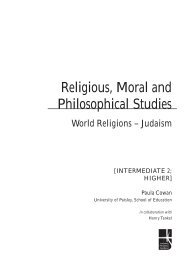PDF file: History - Advanced Higher - Germany - Education Scotland
PDF file: History - Advanced Higher - Germany - Education Scotland
PDF file: History - Advanced Higher - Germany - Education Scotland
You also want an ePaper? Increase the reach of your titles
YUMPU automatically turns print PDFs into web optimized ePapers that Google loves.
Source D<br />
The KPD observes the September 1930 Election.<br />
While the revolutionary progress of the working-class movement increased unabated<br />
even after the election of 14 September 1930, the bourgeoisie took a further step<br />
along the way towards the creation of a fascist state. The Bruning Government,<br />
which destroyed the surviving achievements of the revolution of 1918, which<br />
dismantled the Weimar Constitution clause by clause, which eliminated the influence<br />
of the parliament and turned itself into the executive organ of the employers’ frantic<br />
offensive against the living standards of the proletariat… Has become a government<br />
for the realisation of the fascist dictatorship.<br />
(Fascism and Democracy in the Theses of the KPD, 1931-32)<br />
Source E<br />
Hermann Dietrich, Vice-Chancellor and Finance Minister, comments on the fall of<br />
Bruning on 30 May 1932.<br />
The deeper reasons for Bruning’s removal lie in the fact that a class of people who<br />
had ceased to exercise any decisive influence in the state, namely the old Prussian<br />
element, decided that they would like to rule once more … This element made its first<br />
attempts to seize power at the time of the formation of Bruning’s government.<br />
Bruning was supposed to give the helm a turn to the right … But events were too<br />
strong for him so he was dismissed because he did not fulfil the gentlemen’s<br />
expectations.<br />
Source F<br />
Von Papen recollects his appointment as Chancellor in a ‘Cabinet of Barons’ in May<br />
1932.<br />
He (Schleicher) gave me a general survey of the political situation, described the<br />
crisis within the cabinet, and told me that it was the President’s wish to form a<br />
cabinet of experts, independent of the political parties. It had become technically<br />
impossible to form a parliamentary cabinet, because no combination could command<br />
a majority. The sole remaining constitutional solution was the formation of a<br />
presidential cabinet by the chief of State … He no longer considered it possible to<br />
combat a party as strong as the Nazis by negative means, which had only resulted in<br />
the steady and threatening growth of their power …<br />
Schleicher left me in no doubt that he was acting as spokesman for the army, the only<br />
stable organisation remaining in the State, preserved intact and free of party political<br />
strife by von Seeckt and his successors. He then turned the conversation to the<br />
subject of who could lead the new cabinet…to my amazement Schleicher now<br />
suggested that I should take over this task myself …<br />
<strong>History</strong>: <strong>Germany</strong>: Versailles to the Outbreak of World War II - 1918-1939 (AH) 64
















